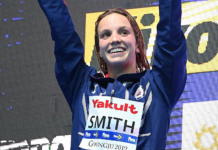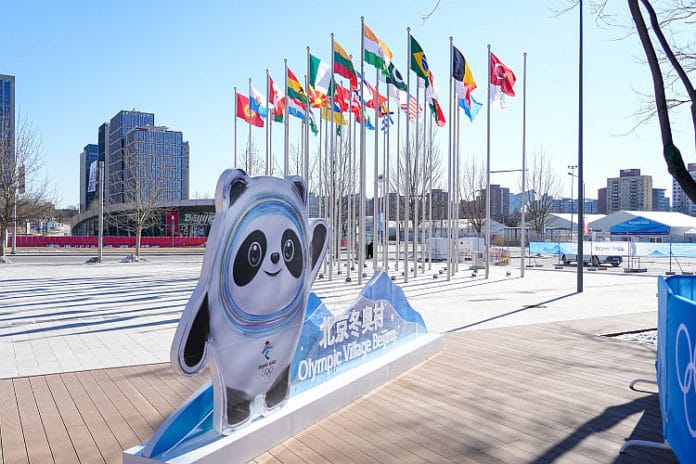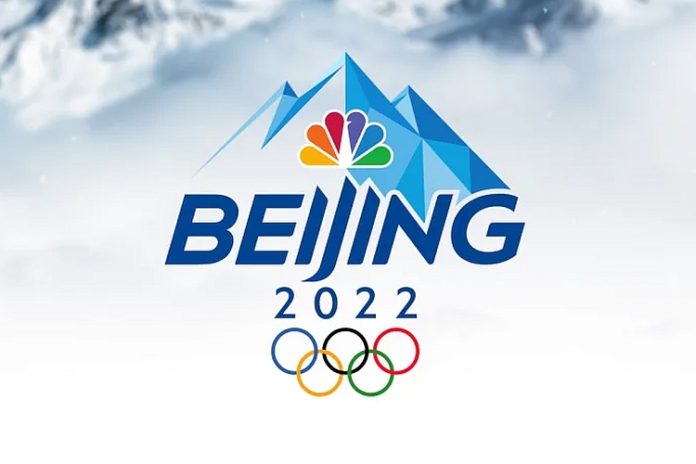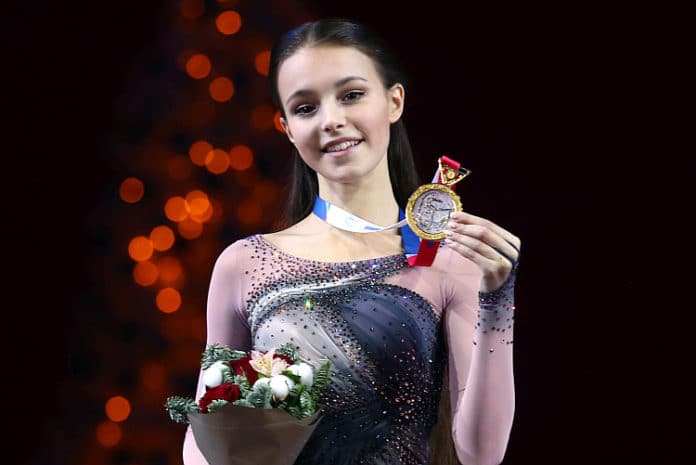(★ Friends: Thank you! Now 26 donors have covered 48% of our site costs for services for the first six months of 2022. If you would like to add your support, please donate here. ★)
= BEIJING 2022 =
From Lane One
“There will be an asterisk against the results on Friday, because they will be preliminary – obviously – pending further investigation.”
That was International Olympic Committee spokesman Mark Adams (GBR) at Wednesday’s daily briefing, explaining how the women’s figure skating results will be handled, with questions over Russian skater Kamila Valieva’s December doping positive still to be resolved. The Team Event results, won by Russia with Valieva playing a key role, will be similarly labeled as preliminary.
Adams continued to be peppered with questions about Valieva and the women’s competition, and he summed up the IOC’s position as
“Would we prefer not to have all this going on, absolutely. Would we prefer to be having a normal competition, without this distracting from it, I think everyone would agree with that, the athletes particularly. And it’s the athletes that I my heart goes out, but we are where we are. The IOC, like everyone else, has to follow the rules and I think we will be, from now on, very strict … I’m not going to be speculating any more on this particular case.
“We have an absolute duty to follow the letter of the law. Due process is very, very important. We all talk about due process when it’s someone else; when it occurs to us, it’s very, very important.”
Also:
“As for the medal ceremony, I think we said in our statement … that we would talk to the [National Olympic Committees] and to the athletes involved and try to work out a suitable and dignified process, either in their country, or at an event, or in Lausanne, but that cannot happen until after the process is over.”
He was also asked about U.S. sprinter Sha’Carri Richardson’s comments on Twitter, comparing her 2021 suspension that kept her out of the Tokyo Games, including:
“Can we get a solid answer on the difference of her situation and mines? [sic] My mother died and I can’t run and was also favored to place top 3. The only difference I see is I’m a black young lady.”
Adams was clearly ready on this one:
“Simply to say: obviously, every single case is very different. This one hasn’t even reached the end of its case yet, but in terms of Miss Richardson’s case, she tested positive on the 19th of June, quite a way ahead of the Games. The results came in early order, for [U.S. Anti-Doping Agency] to deal with the case, on time, before the Games. Miss Richardson accepted a one-month period of ineligibility which began on June the 28th. So, I would suggest that there isn’t a great deal of similarity between the two cases.”
Departures from Beijing are starting now in earnest and the Beijing 2020 organizers noted that some sites are beginning the transition to the Winter Paralympic Games that will start on 4 March.
For the second day in a row, only bottled water was placed on the dais.
¶
The IOC’s head of marketing, Timo Lumme (FIN), was on hand to talk about the success of the Games on television and online, emphasizing that the rights-holding broadcasters are enjoying “a position of dominance in their respective markets” during the Games period.
He speculated that the global audience for the Opening Ceremonies were around 500 million, by far the largest-ever audience for a Winter Games, surpassing the 388 million estimated to have watched the 2014 Games in Sochi. Within China, that audience was the largest on Chinese television since 2012!
Moreover, due to the enormous interest being shown in China itself – with more than 600 million having watched at least some of the Games so far – the total audience for Beijing 2022 will likely reach the two billion mark. In fact, the total viewership in China alone could rival the total worldwide audience for the 2018 PyeongChang Winter Games.
Lumme was also asked when a new agreement for the U.S. rights might be reached. The current deal with NBC is through 2032, but Salt Lake City is in the mix to host the 2030 or 2034 Winter Games, possibly in the next rights deal. But Lumme explained:
“[W]hat will drive a decision for us are the best market conditions. There’s no hurry. Of course, there’s no decision [on 2030 or 2034], and in any case our sales cycle is not necessarily driven by the appointment of a host city. …
“We will continue to look at the market conditions and then, at the right time, we’ll go to market.”
¶
Poland’s Witold Banka, President of the World Anti-Doping Agency, said in a Tuesday interview on the Court of Arbitration for Sport’s ruling allowing Valieva to skate:
“We are disappointed with the way the Arbitration Tribunal approached this ruling. I don’t know why CAS chose not to rely on the World Anti-Doping Code. This is a very controversial decision, because the Code does not provide for special exceptions to the so-called ‘temporary suspension’ in the case of minors.”
He’s quite right about that. The Code does make special allowances as to public disclosures for doping matters concerning minors, but no special treatment as to suspensions for doping offenses. Yet one more question to be resolved over time.
¶
The International Testing Agency returned a doping positive for steroids against Ukrainian cross-country skier Valentyna Kaminska, who finished 79th in the women’s 10 km Classical and 70th in the women’s Freestyle Sprint.
Kaminska has the right to ask for her “B” sample to be analyzed and to appeal to the Court of Arbitration for Sport if desired. This is the second positive to be reported at the Games; the other was against Iranian alpine skier Hossein Saveh Shemshaki.
¶
The Olympic Covid incidence report for 15 February had just two total positives, with one at the airport (31 total arrivals) and none among athletes and coaches. There was one positive in the closed loop among 63,887 tests of other stakeholders.
The totals now show 183 total positives (arrivals and inside the closed loop) among athletes and team officials and 324 among all other stakeholders since the closed loop began operations on 4 January.
The U.S. Olympic & Paralympic Committee reported Wednesday that there were no new cases among the 514 delegates in Beijing, with no one in isolation.
¶
No ratings report from NBC on its Monday primetime broadcast, the third day in the last four without any total-audience information. Sunday’s post-Super Bowl primetime Olympic show got a big response, with 24.0 million viewers.
Using NBC’s data plus TSX estimates for Friday and Saturday, the first 10 days of the Games (not counting the pre-Games telecast), had an average primetime total audience of 13.3 million.
That’s down 33% from the nightly average of 19.8 million for the PyeongChang Games in 2018 and down from the 15.1 million nightly primetime average for the Tokyo Games last summer.
¶
Norway forged ahead with two more medals and has 28 in total (13-7-8), four ahead of second-place Russia (24: 4-8-12) with Germany third at 20 (10-6-4).
The U.S. moved into fourth place with 19 total (8-7-4), just ahead of Canada (18: 3-4-11).
For a better comparison of team strength, here are our TSX scoring rankings, using the top eight places, via the time-honored U.S. scoring of 10-8-6-5-4-3-2-1. So after 86 of 109 events:
1. 337, Norway
2. 286, Russia
3. 274, United States
4. 270, Germany
5. 241, Austria
6. 219, Canada
7. 196, Italy
8. 176, South Korea
9. 174, Sweden
10. 166, China
11. 161, Japan
12. 147, France
As devoted TSX reader and former Los Angeles Olympic Organizing Committee Vice President David Simon likes to point out, there’s a strong correlation between the top scoring countries and those which have hosted the Olympic Winter Games. Eleven of the top 12 have been OWG hosts, with the single exception of Sweden, which saw Stockholm lose to Milan Cortina for 2026. At least they were interested!
~ Rich Perelman
= RESULTS: WED., 16 FEBRUARY =
● Alpine Skiing: Men’s Slalom
When you’re hot, you’re hot. And when you’re star, you’re a star.
Both axioms were in play on Wednesday morning, as Austrian Johannes Strolz continued his hot skiing by leading the Slalom after the first run, timing 53.92 to stand just ahead of 2014 bronze medalist Henrik Kristoffersen (NOR: 53.94), reigning World Champion Sebastian Foss-Solevaag (53.98) and Switzerland’s double Worlds bronze medalist Loic Meillard (54.22).
Strolz, 29, won the Combined earlier – his father, Hubert, won the Combined in Calgary in 1988 – after earning his first World Cup medal in a Slalom in January 2022. He’s on a roll.
The second run, under sunny skies and good conditions, saw Swiss Daniel Yule – 13th in the first run – lay down a strong time that lasted for skier after skier, finishing in 49.89 (!) for a total of 1:44.95. Eight skiers later came French Slalom star Clement Noel, sixth in the first run and a nine-time World Cup Slalom winner over the past four seasons.
His second run was special, especially in the final third of the course which bedeviled so many, clipping the gates, turning his weight with perfect timing and accelerating toward the next gate without any wasted motion. He finished in 49.79, best of the day, and took the lead with a total time of 1:44.09.
Five skiers remained: Linus Strasser (GER) was slower than Yule and moved into third, where he was quickly passed by Meillard (1:44.89), who was himself passed by Foss-Solevaag, who moved into second.
Kristoffersen started fast, but also suffered some movement around the gates in the lower half of the course and ended at 50.94 and 1:44.88 to stand third with only Strolz remaining. The Austrian’s run also started brilliantly, but he hit the same difficulty as everyone except Noel, slowing slightly on the bottom third and crossing in 50.78, only 13th-fastest in the second run, but earning the silver in 1:44.70.
Noel was seen as a star-in-the-making in 2019 when he stormed to the seasonal runner-up position in the World Cup Slalom standings, and at 24 is not only the seasonal leader in the Slalom, but now Olympic Champion. He moved up from fourth in PyeongChang in 2018 and his win was the first for France in the Slalom since 2002 and France’s third in Olympic history, starting with the legendary Jean-Claude Killy back in 1968.
Strolz helped Austria maintain its dominance in this event, winning at least one medal in the Slalom in eight of the last nine Games. All-time, Austria has 18 medals in Slalom, first contested in the Games in 1948; Italy and France are second with eight.
● Biathlon: Women’s 4×6 km Relay
The Oeberg sisters, Hanna and Elvira, brought Sweden from third to first in the women’s relay, with Elvira winning in 1:11:03.9, some 12.3 seconds ahead of the Russian quartet (1:11:15.9).
Germany’s Vanessa Voigt led after the first leg, with Linn Persson of Sweden second, but the Swedes fell back to sixth after Mona Brorsson’s second leg. That’s when Hanna Oeberg took over, racing into the lead on the final loop to hand over to Elvira.
The younger Oeberg was never headed, suffering only one penalty, to earn Sweden’s its first win in this event. Persson, Brorsson and Hanna Oeberg moved up from silver in this event in 2018, and this was Elvira’s first Olympic gold, to go along with the two silvers she had already won in Beijing in the Sprint and Pursuit.
The Russians were in contention throughout and Uliana Nigmatullina’s anchor leg – second-fastest in the field – brought them from third to second. The Germans were third (1:11:41.3), more than 13 seconds ahead of Norway (1:11:54.6). Double gold medalist Marte Olsbu Roeiseland had the fastest final leg in the race, but could only move up from fifth to fourth.
The U.S. team of Susan Dunklee, Clare Egan, Deedra Irwin and Joanne Reid was 11th.
● Cross Country Skiing: Men’s Team Sprint ~ Women’s Team Sprint
Norway, Finland and Russia contested a tight relay, with Sprint gold medalist Johannes Hoesflot Klaebo logging the fastest anchor leg in the field to win his second consecutive gold medal in the Team Sprint.
The Norwegians won with Klaebo and Martin Sundby in 2018, with Erik Valnes joining Klaebo this time in a Classical Sprint and always in the lead or close to it. By the end of the third leg, Finland’s Iivo Niskanen gave anchor Joni Maki a tiny lead, with Klaebo and Alexander Terentev chasing.
Klaebo brought it home, timing 3:20.4 for his leg, to 3:23.3 for Niskanen and 3:24.3 for Terentev, giving Norway the win in 19:22.99, to 19:25.45 for the Finns and 19:27.28 for the Russians. Sweden was fourth in 19:38.05.
The U.S. pair of Ben Ogden and James Schoonmaker was ninth in 20:28.07.
This was the fifth time the Team Sprint had been conducted, with the Russians winning a medal for the fifth time and Norway in four out of the five, including three wins.
¶
Germany’s Katharina Henning and Victoria Carl pulled off an upset in the women’s Classical Team Sprint, beating favored Sweden by 0.17 and Russia by 0.71 as Carl made a final surge to the line.
Swedes Maja Dahlqvist and Jonna Sundling battled through the race with the Germans, Russia’s Yulia Stupak and Natalia Nepryaeva, Finland’s Kerttu Niskanen and Krista Parmakoski and the U.S., but always close or in the lead. Sundling was headed home for a possible win, but Carl’s final push got across the line first in 22:09.85 to 22:10.02, to 22:10.56 for the Russians.
Just behind the leaders was the American pair of Jessie Diggins and Rosie Brennan, fourth in 22:22.78, 12.93 behind the winners. This was an impressive performance, as the Americans are more proficient in Freestyle, where Diggins and Kikkan Randall had won four years earlier. Brennan was third at the last exchange, but Diggins faded slightly on the anchor.
● Freestyle Skiing: Men’s Aerials ~ Men’s Slopestyle
China continued its run of success in the Aerials, as Guangpu Qi pulled off an elegant back somersault with five twists to score 129.00 to win over defending champ Oleksandr Abramenko (UKR) and 2018 bronze medalist Ilia Burov from Russia.
Abramenko tried the same trick, but scored lower on height, form and landing to finish with 116.50 and the silver medal. Burov’s jump was less complex and earned 114.93 to place third.
Americans Justin Schoenefeld and Chris Lillis, both part of the Mixed Team gold medalists, both tried Qi’s maneuver, but finished fifth and sixth at 106.50 and 103.00, respectively.
This was China’s second gold in the men’s Aerials, and its fifth straight Games with a medal in the event.
¶
How many times have we heard, in every sport, about how getting an early lead makes such a big difference. It relaxes the leader and puts pressure on everyone else.
That’s what American Alex Hall did in the men’s Slopestyle final. The 2021 World Championships bronze medalist, the Alaska native was 16th in this event in his Olympic debut in 1998. But on Wednesday, jumping eighth in the order, he pulled off a perfectly-balanced run, with a 1620-spin in the middle and then the “flying pretzel” – landing a right double cork 1080 into a 900-degree spin at the end of the run to score 90.01 and take a solid lead.
Considering that the top score in qualifying was an 85.08, it was possible that Hall had won the event right there. And he did. No one else was close.
Jumping right after Hall was Swede Jesper Tjader, who was also impressive and scored 85.35 for second. But no one else scored higher than 78.20.
The second round saw a major improvement from American Nick Goepper, who took over second place at 86.48; the only other score over 80 in the round came from qualifying leader (and current World Champion) Andri Ragettli (SUI) at 83.50, moving him into fourth.
More of the same in the final round, with scores of 40.46, 70.40, 13.98, 49.83, 67.40, 55.18, then 31.41 for Hall, 37.33 for Jesper, 53.45 for Goepper, a best-of-the-day 79.33 for Big Air winner Birk Ruud of Norway and 33.95 for Ragettli. Tjader’s first-round jump earned him the bronze.
That 90.01 busted the event open and only Hall’s teammate Goepper – in his third Olympic Games – could even come close. Hall, 23, moved from a Worlds bronze to an Olympic gold and with Goepper’s silver, continued the American domination of this event. Of the nine medals in Olympic Freestyle Slopestyle history, the U.S. has won six … and Goepper (bronze-silver-silver) owns a third of them!
The third American entry, Big Air silver medalist Colby Stevenson, scored 77.41 in the first round, but did not improve, finishing seventh.
● Short Track: Men’s 5,000 m Relay ~ Women’s 1,500 m
Canada has been the top scorer in this event, with medals in six of the eight times it had been contested in the Winter Games, and added a fourth win in 6:41.257, just ahead of South Korea in 6:41.679.
The Canadian quartet of Charles Hamelin, Steven Dubois, Jordan Pierre-Gilles and Pascal Dion got the gold as Dubois held off Yoon-gy Kwak on the race to the line. The fight for the bronze was much closer, as Italy held off Russia by 0.009: 6:43.431 to 6:43.440.
For Hamelin, 37, this was a special moment as he won his fourth career Olympic gold, including the 500 m and relay in 2010 in Vancouver, the 1,500 m in Sochi and now the relay in Beijing, plus a relay silver in Turin in 2006 and a relay bronze in 2018.
¶
Korea’s Min-jeong Choi successfully defended her Olympic title in the women’s 1,500 m, but silver medalist Arianna Fontana (ITA) and Suzanne Schulting (NED) also achieved milestones.
Choi, Schulting and Korean Yu-bin Lee won the three semifinals, but Choi was the class of the final, winning by daylight in 2:17.789 to 2:17.862 for Fontana. The Italian took the silver by throwing her skate forward to edge Schulting by 0.003. Belgian Hanne Desmet was fourth in 2:18.711.
It was Choi’s third career Olympic gold, after the PyeongChang 1,500 m and relay wins; she also has two silvers from the 2022 Games in the 1,000 m and the relay.
The amazing Fontana, 31, won her 11th career Olympic medal, the most ever in Short Track and her second in these Games. Schulting completed a sweep: she won a medal in all four events (2-1-1), to give her six career Olympic medals at age 24. That’s the first time for one person to win a medal in all four women’s Short Track events at a single Games; China’s Yang Yang (S) won medals in all three events in 1998. (It has been done a couple of times by men, in 2006 and 2014.)
American Kristen Santos won her heat, but did not qualify for the medal final and ended up second in the B-final.
Elsewhere:
● Curling: The U.S. women’s squad, skipped by Tabitha Peterson, lost to Canada (7-6) and to Japan (10-7) to finish at 4-5 in the round robin and will not advance to the playoffs.
With four matches still remaining, World Champion Switzerland (Silvana Tirinzoni) remains on top at 7-1, with defending Olympic champ Sweden (Anna Hasselborg) at 6-2. The two will meet in the last round of the round-robin, but both are safely into the semifinals.
¶
John Shuster’s U.S. men team got a break as Russia lost to Great Britain, 8-6, and ended round-robin play at 4-5. The U.S. is 4-4 and with a win against 1-7 Denmark, can lock up the fourth spot at 5-4 and move into the semis.
● Ice Hockey: Both the U.S. and Canada were bounced from the men’s tournament, with the Americans suffering a heartbreaking shoot-out loss to Slovakia, 3-2 and Canada shut out by Sweden, 2-0.
The U.S. took a 2-1 lead in the second stanza on a Sam Hentges goal at 8:56 of the period, but was unable to score again, despite two power-play opportunities.
That 2-1 edge held up for almost the entire third period, with the U.S. unable to score on three more power plays. The Slovaks pulled their goalie with 1:33 to play and with an extra attacker, tied the game with 43.7 seconds left as Marek Hrivik scored on a rebound of a Michal Cajkovsky shot.
The U.S. had a 7-4 shots advantage in the 10-minute, three-on-three overtime, but couldn’t score, leading to the shoot-out.
Keepers Patrick Rybar (SVK) and Strauss Mann for the U.S. each turned aside the first three shots against them, but Peter Ceresnak got the fourth shot past Mann and as Rybar saved Andy Miehle’s attempt, the Slovaks advanced.
Canada and Sweden were 0-0 into the third period, but Lucas Wallmark got a goal at the 10:15 mark and that was essentially the game. Lars Johansson handled 22 shots from Canada and the Swedes got an empty-netter with 1:50 to go for the 2-0 final.
Finland clubbed the Swiss, 5-1, to advance to the semis against Slovakia; defending champs Russia skated past Denmark, 3-1 and will meet the Swedes on the 18th.
= PREVIEWS: THU., 17 FEBRUARY =
(6 events across 6 disciplines)
● Alpine Skiing: Women’s Alpine Combined
The IOC has been trying to get rid of the Combined for years, but it’s still here. And that might be a good thing for American Mikaela Shiffrin, who is the reigning World Champion in the event from 2021.
She also won the 2018 Olympic silver behind Swiss Michelle Gisin, who already won the Super-G bronze in Beijing. Add in Beijing Slalom bronze medalist Wendy Holdener – who won the 2018 Olympic Combined bronze medal – and you have your favorites.
In general, the Slalom skiers tend to do better in the Combined as the speed racers are not as good on the twists and turns of the Slalom courses. Shiffrin, Gisin and Holdener all have World Cup Slalom medals this season and Shiffrin has been one of the best Slalom skiers in the world for years … but skied out in Beijing, to her own shock.
Other contenders could come from Italy, such as Olympic Giant Slalom silver medalist Federica Brignone or World Cup Super-G medal winner Marta Bassino. Or something insane could happen, with a Downhiller like Ramona Siebenhofer (AUT), Italians Elena Curtoni or Nicol Delago or Snowboard Slalom star Ester Ledecka (CZE) surprising everyone.
But if Shiffrin, who was 18th in the Downhill, were to have a good day, she could end up on the podium once again, with a fourth career Olympic medal.
● Figure Skating: Women’s Free Skate
Russian Kamila Valieva cemented her place as the Olympic favorite with two sensational wins in December and January, at the Russian Nationals and the European Championships:
● Nationals: 1st, scoring 90.38 + 193.10 for 283.48
(national judges)
● European: 1st, scoring 90.45 + 168.61 for 259.06
(international judges)
She owns the highest-ever score in international competition with her 272.71 at the ISU Grand Prix Rostelecom Cup in November 2021 and owns the top four scores of all time.
Valieva leads after the Beijing Short Program at 82.16, stepping out of a planned triple Axel, but hitting on a triple Flip and a triple Lutz-triple Toe combination, ahead of teammate (and 2021 World Champion) Anna Shcherbakova (80.20) by almost two points.
Shcherbakova has scored as high as 168.37 in the Free Skate, also at the 2022 Europeans, so she is a contender for gold, but Valieva has scored higher than that four times in international events: 185.29 at the Rostelecom Cup, 180.89 at Skate Canada, 174.31 at the Finlandia Trophy in 2021 and 168.61 at the Europeans.
So even amid all the pressure, chatter and questions, the 15-year-old Valieva has to be the favorite and if she medals, there will be no medal ceremony per the IOC’s edict, in view of her pending doping positive.
Shcherbakova has scored a personal high of 241.65, in 2021, compared to 241.02 for current fourth-placer, Russian Alexandra Trusova and 228.07 for Japan’s Kaori Sakamoto, standing third after the Short Program, 79.84-74.60.
Sakamoto, sixth in PyeongChang in 2018, got a lifetime best in the Short, and her best ever in the Free Skate is 150.29 points from April 2021. Trusova has scored as high as 166.62, at Skate Canada this season, and could score the bronze and complete a Russian sweep. In fact, Trusova passed Shcherbakova to come from fifth to second at the Russian Nationals in the Free Skate.
It would be a complete shock for another skater to challenge for a medal, unless the favorites all fall down. Japan’s Wakaba Higuchi – the 2018 Worlds silver medalist – currently sits fifth at 73.51 and will likely stay there.
The U.S. stands 8-11-13 after the Short, with Alysa Liu (69.50), Mariah Bell (65.38) and Karen Chen (64.11); a strong program from Liu could move her up a couple of places.
● Freestyle Skiing: Women’s Ski Cross
Canada has won all three editions of this event in the Olympic Games, with Sochi winner Marielle Thompson back once again, as well as PyeongChang runner-up Brittany Phelan. But they aren’t close to being the favorite.
That would be Sweden’s two-time World Champion Sandra Naeslund, who has dominated the World Cup racing this season with nine wins in 10 events. Any outcome other than Naeslund at the top of the podium will be a big surprise.
Now, Thompson did win the one race that Naeslund didn’t, and Swiss Fanny Smith – the 2018 bronze medalist and 2013 World Champion – has reeled off three straight World Championships silvers in 2017-19-21 to Naeslund (twice) and Thompson, who won in 2019. They are clearly in the hunt for medals.
Others who could be in the mix if any of these stars break down include two-time Worlds bronze medalist Alizee Baron (FRA) and teammate Jade Grillet-Aubert; German Daniela Maier; Austria’s Katrin Ofner, and Swede Alexandra Edebo. But they will most likely be congratulating Naeslund.
● Ice Hockey: Women’s final
Here we go again. In the seven Olympic women’s finals, the U.S. and Canada have met six times, with Canada winning four. But the U.S. won in PyeongChang and has a chance once again.
The teams know each other frightening well. In Beijing, Canada won in the group stage on the 8th by 4-2, surviving a 53-27 shots advantage for the Americans as Ann-Renee Desbiens was superb in goal. American keeper Maddie Rooney, a hero of the 2018 gold-medal win, let in four goals on 27 shots.
Desbiens has faced 110 shots and given up seven goals in the tournament for a 1.75 per-game average, while Alex Cavallini has been the best in net for the U.S., giving up two goals in 44 chances (0.67 goals per game average). Cavallini or Rooney in the final?
Canada has scored a preposterous 54 goals in its six games and Brianne Jenner (9), Sarah Fuller (8) and Jamie Lee Rattray (5) lead all scorers in the tournament, with Hilary Knight of the U.S. tied with Rattray with five goals.
The teams are so far ahead of the rest of the world that they concentrate on playing each other. An nine-game exhibition series, called the My Why Tour, was scheduled for October to January, but Covid issues allowed only six of the games to be played. Canada won four of the six, but all of the games were close: 3-1, 3-2, 3-2 (overtime), 2-0, 2-1 (overtime) and 3-2 (overtime).
All the indicators point to another close Canadian win. But that was true in 2018 as well.
● Nordic Combined: Team Large Hill/4×5 km
Only one Team event was held during the World Cup season so far, with Norway defeating Germany and Japan third. That’s about the way it stacks up for Beijing.
In the Large Hill competition, Norway placed 1-2-8-15, with Germans in 4-7-10-28 and the Japanese entries finishing 3-12-25-31. The Norwegian top three of Jorgen Graabak, Jens Oftebro and the recovering Jarl Magnus Riiber make them the favorite. The German top three of Manuel Faisst, Vinzenz Geiger and Julian Schmid was solid and a better performance can be expected from Johannes Rydzek, who was 29th.
Another contender is Austria, which showed great depth in the individual event, finishing 5-6-11-13, with both Lukas Greiderer and Johannes Lamparter in the top 10. The U.S. entries finished 17-19-23-34, led by Jared Shumate; perhaps in the top six?
● Speed Skating: Women’s 1,000 m
Erin Jackson has her gold. Now it’s Brittany Bowe’s turn.
The World Champion at this distance in 2015, 2019 and 2021, Bowe won medals in all four World Cup races this season, going 1st-1st-3rd-2nd, losing one to Japanese star Miho Takagi, the PyeongChang bronze medalist and once to sprinter Nao Kodaira.
Kodaira and Takagi went 2-3 in PyeongChang in 2018, with Bowe fourth.
Any discussion of speed skating must ask: what about the Dutch? The legendary Ireen Wust has already won the 1,500 m and was the Olympic 1,000 m silver medalist in 2014. Jutta Leerdam won the 2020 world title and was second to Bowe in 2021.
Not to be overlooked: Russian Olga Fatkulina was Worlds runner-up in 2020 and won a World Cup bronze during the season at this distance, plus Austria’s Vanessa Herzog, the 2019 Worlds silver medalist in this event.
But Bowe is the favorite, and a three-time world-record setter. She finished eighth in this event in 2014 and was fourth in 2018, missing the bronze by 0.38 seconds. In her brilliant career, she has been a three-time Olympian, but has not yet won an individual medal.
Bowe will turn 34 on 24 February: all she wants for her birthday is to stand on the top of the podium. After Bowe gave up her spot on the U.S. team to ensure that Jackson would compete – Bowe eventually got to race as well – it’s sure that Jackson will be cheering the loudest for her friend to get her own gold.
= BEYOND BEIJING =
● XXIII Commonwealth Games: 2026 ● Australia’s state of Victoria has been selected by the Commonwealth Games Foundation to enter into an “exclusive dialogue period” that should see it selected to host the event.
The 2026 Games had become an orphan, but now appears to be headed to Australia for the sixth time. It was previously held there in 1938 (Sydney), 1962 (Perth), 1982 (Brisbane), 2006 (Melbourne) and very successfully in 2018 in Gold Coast. This will be the second time in Victoria, after the 2006 Melbourne Games.
The official selection could come in April; a more regional approach is envisioned, rather than centralizing the Games in Melbourne.
● Aquatics ● FINA announced a $5.72 million prize money total for the 2022 World Aquatics Championships this summer in Budapest (HUN), with $20,000 to the winners of any of the individual events in swimming, diving, and artistic swimming.
Prizes will be paid for places 1-8: $20,000-15,000-10,000-6,000-5,000-4,000-3,000-2,000. The winning water polo teams will receive $80,000, and winning artistic swimming teams will get $50,000.
A $50,000 bonus will be paid for world records set as well.
● Athletics & Swimming ● Interesting development from Colorado Springs and Indianapolis:
“USA Swimming, the National Governing Body of swimming in the United States, and USA Track & Field, the National Governing Body of track and field, long-distance running and race walking in the U.S., today announced the release of a national Request For Proposal (RFP) process to sign a leading agency to package and sell key categories and properties for both entities.”
The proposed scope of work is described as:
“The preferred agency will identify, solicit and engage prospective sponsors for USA Swimming and USA Track & Field and any or all of their official rights, event and media opportunities as they relate to the organizations’ sponsorship programs and benefits. The partnership opportunities being offered are in key categories such as – airline, consumer package goods (CPG), payment and financial services, and cryptocurrency.”
Both federations have long been criticized by some observers for their relatively light sponsorship programs in view of their enormous contributions to the U.S. Olympic medal haul every four years. This new approach will be designed to cure that.
● Swimming ● The popular, three-meet Mare Nostrum series – started in 2000 – has had to move its 2022 dates due to a new conflict with the re-scheduled FINA World Championships. Originally pegged for mid-to-late June, the new dates are in May.
The Munich meet will now be held on 21-22 May, followed by Barcelona on 25-26 May and Canet-en-Roussillon on 28-29 May.
You can receive our exclusive TSX Report by e-mail by clicking here. You can also refer a friend by clicking here, and can donate here to keep this site going.
For our 832-event International Sports Calendar for 2022 and beyond, by date and by sport, click here!























